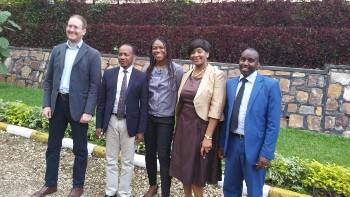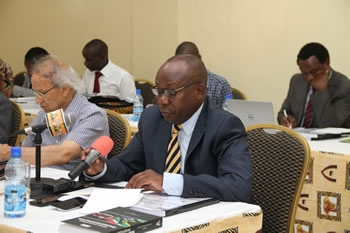Empowering prisoners to represent themselves

Around 40% of the prison population in Kenya are held on remand without access to a fair trial. They can remain in prison for years – a decade is not uncommon. According to a UNODC report, prisoners who are poor, have low levels of literacy and low levels of education are forced to navigate the judicial system alone where they encounter a complex labyrinth of laws, traditions, copious paperwork and restrictive time limits.
Compounded by the fact that legal aid at state expense is limited to those charged with capital offences, the poor are disproportionately more likely to remain in custody beyond constitutional limits.
While Kenya has made good progress towards realising the rule of law, enhancing opportunities for men and women to receive representation and a fair hearing has the potential to resonate more widely on the political spectrum and increase momentum towards fairer and more just practises, thus strengthening the rule of law.
The African Prisons Project (APP), is an organisation that works to reform the criminal justice system to rehabilitate and empower prisoners, in order to reduce the number of prisoners on remand. APP applied to ROLE UK seeking legal support to produce manuals for bail and appeals procedures, that also looked at alternative dispute resolution methods. The manuals are intended to allow inmates to better represent themselves and each other, leading to fewer detainees. They will also help prevent the initial incarceration of people accused of petty crimes and help divert people from a custodial sentence where it becomes more difficult to be heard.
The project aims to improve access to justice for prisoners, one of the most poor and marginalised groups, and thereby falls directly under ROLE UK’s work on improving equality and social justice.
ROLE UK supports Rule of Law assignments that are strategic in their design. In this instance, ROLE found evidence that Coulson Harvey, a Kenyan law firm, The Law Society of Kenya, the Kenya School of Law and the Attorney General’s National Legal Aid and Awareness Programme (NALEAP) had all pledged various levels of support and involvement to the project and to wider reforms, demonstrating a larger political will and sound momentum for change.
In addition, APP had already secured funding for the project from the Clifford Chance Foundation, along with commitments from other UK law firms to mentor students and establish legal aid clinics. ROLE supports such collaborative approaches as they help ensure that projects are sustainable in the long run.
ROLE enabled three UK legal specialists, Tom Dunn, Director of Pro Bono at Clifford Chance, Lucy Stoy and Andrew Murn, experienced international litigators to gauge the scale and extent of the work going on, visit the sites, engage directly with the staff and prison inmates first-hand, advise on the scope of the project and help develop the legal manuals.
Our specialists found this direct, peer-to-peer approach extremely valuable, stating that it allowed them to reflect on the capacity of those who would eventually use the manuals with much greater accuracy, thereby enabling them to develop the most tailored resources.
Feedback from Kenyan stakeholders illustrated that the visit was crucial in enabling justice system stakeholders to meet and deliberate on the best possible way forward. The fact that the UK experts visited the project sites, were familiar with domestic laws, met and engaged with the beneficiaries and crystallised working relationships with local partners was seen as genuinely facilitating progress by the Kenyans.
“It is very good to see the UK team went through the materials sent beforehand. This greatly helped both UK and Kenya teams move ahead on the assignment from a point of understanding of Kenya Statute Law, policies and case law.”
-African Prison’s Project

